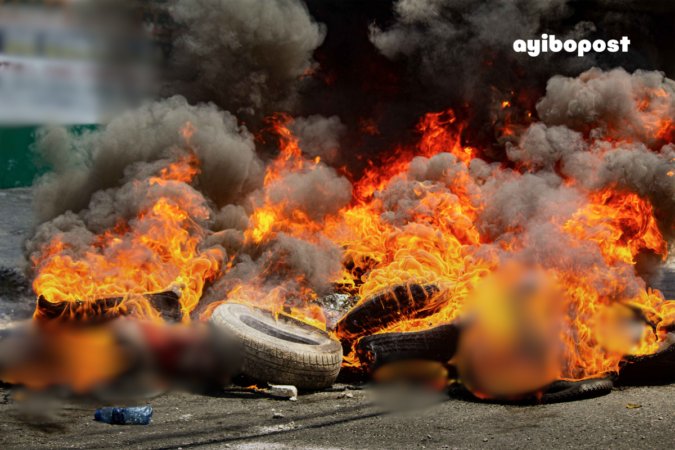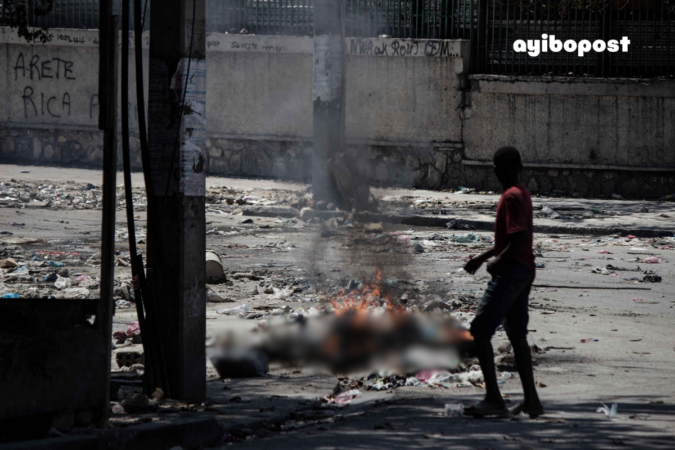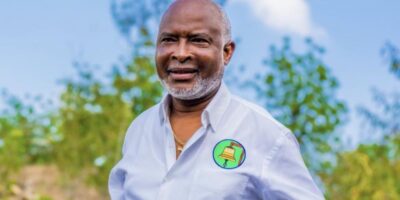« Amnesty is a French word. In Creole, it means ‘bwa kale’, » says a police officer in the city of Jérémie
One afternoon in September 2022, a resident of Turgeau caught a young man in the act of stealing the battery of a vehicle in a private yard.
Armed only with his tools, the young man was severely beaten. But the citizens decided to call the police to retrieve him.
When they arrived at the scene, the officers – in a white and blue pickup truck – battered the young man in the back of the vehicle, according to observations by an AyiboPost journalist.
As he was about to leave the scene, one of the policemen turned to the crowd, with a disapproving look: « You have a ravine nearby and you are calling the police for a thief? »
Armed only with his tools, the young man was severely beaten. But the citizens decided to call the police to retrieve him.
On April 24, 2023, fourteen suspected bandits were handed over by police officers to an angry crowd in Canapé Vert, according to a human rights organization.
The event marked the beginning of the « bwa kale » movement through which members of the population set themselves up as policemen, detectives and vigilantes.
Any individual suspected of banditry, caught in action, or driving without a national identification card, in an area not his own, can be intercepted, interrogated and sometimes killed.

On April 24, 2023, individuals suspected to be bandits were shot and then burned with tires by an enraged mob in Canapé Vert. | © Jean Feguens Regala/AyiboPost
Barricades were erected to surround certain neighborhoods.
Surveillance groups are sometimes set up to watch over comings and goings day and night.
Read also : Photos | Les barrières se multiplient à l’entrée des quartiers à P-au-P
204 alleged gang members and relatives died between April 24 and June 24, 2023, according to the Center for Analysis and Research in Human Rights (CARDH) in a report published on June 24, 2023.
Since the start of the movement, several hundreds, perhaps even thousands, of people suspected of banditry have been lynched by the population throughout Haiti.
These acts occur in a country caught in the grip of organized crime.
In 2023, the United Nations reported more than 4,700 homicide victims across the country.
In the first quarter of 2024, about 2,500 people were killed or injured in gang violence, according to the UN, which last year approved the deployment of a security mission, led by Kenya, to help police fight gangs.
The mission’s operating procedures are not yet public.
But already, a forceful intervention by police officers – alone – or supported by foreign elements is introducing a window for excesses and an acceleration of summary executions the likes of Bwa Kale.

A curious teenager peers into a charred body in the streets of Port-au-Prince on March 4, 2024, on Rue Oswald Durand, a few meters from the National Palace.
Contacted by AyiboPost, presidential adviser Lesly Voltaire fears gang members may flee the capital for rural areas, thus increasing the likelihood of violence against the rural population.
« No one is in favor of amnesty, » according to Voltaire, who calls for the creation of a committee of justice and truth to encourage gangs to lay down their arms.
Watch this explanatory video from AyiboPost to understand the concept or word « Amnesty », which is very common in Haiti today:
Hundreds of police officers have fled the country in recent years. Estimates for 2023 put the number of Haitian National Police (PNH) staff at 13,000 agents for a country of more than 11 million inhabitants.
Between June 2022 and June 2023, the National Network for the Defense of Human Rights (RNDDH) recorded 58 police officers murdered.
This is why any call perceived as leniency towards gang leaders receives a lukewarm reception within the police institution. An institution whose dozens of members have perished in recent years in clashes with gangs.
« Amnesty is a French word. In Creole, it means ‘bwa kale’, » a police officer in the city of Jérémie said via WhatsApp.
Some neighborhood surveillance brigades are led by police officers, accompanied by civilians, sometimes armed.
Pierre, for example, is a divisional inspector. He has been coordinating a surveillance brigade in the Carrefour-Feuilles slum since the launch of the Bwa Kale movement.
Presidential adviser Lesly Voltaire fears gang members will flee outside the capital, increasing the likelihood of violence against the rural population.
Pierre’s men regularly carry out searches on all unknown people frequenting the area.
The executive of the police institution says he is keeping watch so that no member of his troop abuses innocent people.
These precautions don’t stop things from going wrong.
On April 24, 2023, for example, a young man was murdered in Turgeau because he had no identification with him, an AyiboPost journalist found. Relatives, brought to the scene, later claimed that he had no ties to crime.
In a report released in May 2023, the RNDDH protested against « the state authorities who hide behind [the bwa kale] movement tto encourage the Haitian population to eliminate their links with the individuals they have armed, and at the same time prevent the law from being traced back to them. »
To AyiboPost, the RNDDH program manager, Marie Rosy Auguste Ducena, criticized the « anti-ethical » behavior of the police officers who handed over the 14 people suspected of acts of banditry to the population in April 2024.
Read also : Photos | Des Haïtiens tatoués sous la menace constante du «Bwa Kale»
The movement took place in a context of dysfunction in the country’s sovereign institutions, often out of phase with the needs of society.
Haiti’s legal system, modeled on French law, contains centuries-old texts. The Penal Code dates back to 1825 and the Civil Code to 1835.
« It is because the justice system does not normally fulfill its function that the population is taking justice into its own hands through the Bwa Kale movement, » says Ducena.
Long before Bwa Kale, recourse to formal justice was an exception in some rural areas.
« The justice system does not function under normal conditions [in particular] because of the incessant strikes in the system, » criminal law specialist Frantz Gabriel Nerette told AyiboPost.
This private vengeance would be motivated by all the « disgust and frustrations of the population towards the state systems [incapable] of producing results, » analyzes Nerette.
It is because the justice system does not normally fulfill its function that the population takes justice into its own hands through the Bwa Kale movement.
– Marie Rosy Auguste Ducena
Private ownership of justice and community security is not new in the country’s history.
Former police officer Abelson Gros Nègre participates in vigilantism initiatives at Carrefour-Feuilles.
The former spokesman for a police union says that in 1991, « despite still being a child, » he witnessed the response of the slum’s surveillance brigades « in the face of bandits who wanted to besiege the area. »
Historian and professor at the State University of Haiti, Derinx Petit Jean, distinguishes at least 5 movements with features similar to the Bwa Kale in Haiti’s history.
First, in the 18th century with the picket movement that began in 1843 in the south, led by Jean Jacques Acaau.
Then there was the Zinglins movement, a paramilitary group that originated under the government of Faustin Soulouque.
The « zero tolerance » policy under the presidency of Jean Bertrand Aristide. And the two versions of the Peyilòk movement, in 2019 and 2022 respectively.
Private ownership of justice and community security is not new in the country’s history.
« We are here because Port-au-Prince is becoming highly populated area, » says Professor Derinx Petit Jean. « The majority of the inhabitants live in the capital. This creates a concentration of fear. »
The movement does not solve the problem of displacement caused by insecurity in the country, according to specialists.
If in the past people did not move to avoid being kidnapped or raped, today « the Bwa Kale movement has reduced the movement of people to other places where they are not known to be killed, » sociologist Mordecai Gédéon told AyiboPost.
In fact, most gangs start as community protection associations.
« This is the case for most of the gangs in Cité-Soleil, Grand Ravin, Martissant, Village de Dieu, etc., » says sociologist Fritz Dorvilier.
« These groups can become tools of repression and exert forms of symbolic and physical violence: disrespect for elders, members of the population, predation on community resources, shootings, brutality, » concludes the sociologist.
We are where we are because Port-au-Prince is becoming a highly populated area. The majority of the inhabitants live in the capital. This creates a concentration of fear.
– Derinx Petit Jean
The movement gave rise to scenes of unprecedented violence, sometimes shared widely on social networks.
Interviewed by AyiboPost, doctor of Clinical Psychology and Psychopathology, Jeff Matherson Cadichon, talked about the potential for spectators to experience psychic pain, dread, shock, anguish or even shame.
On October 13, 2003, at one o’clock in the morning, as darkness enveloped Ruelle Alcius in the commune of Gonaïves, about three armed men, with their faces uncovered, broke down the doors and brutally invaded Chenet’s house located in Descahos.
In the midst of all the hustle and bustle, it quickly dawned on the man in his early thirties that his home had been invaded by thugs
His motorcycle, his wife’s gold rings and other valuables were taken.
The next day, individuals were identified by the population as the perpetrators of the attack.
Read also : Des «kafou lanmò» se multiplient à Port-au-Prince
A fortnight later, one of them was captured in the heights of Morne Blanc, in the commune of Gonaïves, by a handful of people alert at 10 o’clock in the evening.
His body was butchered with a machete. His bare belly adorned by his severed sex and exposed to the open sky.
There is no indication whether the man had actually taken part in the burglary.
By Fenel Pélissier, Widlore Mérancourt, Rolph Louis-Jeune & Legrand Junior
Jérôme Wendy Norestyl contributed to this report
The photos are from Jean Feguens Regala/AyiboPost.
Keep in touch with AyiboPost via:
► Our channel Telegram:click here
► Our Channel WhatsApp:click here
► Our Community WhatsApp:click here







Comments